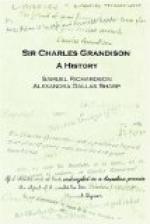Lady G. I am a meek, humble, docile creature. She turned to me, and made me a rustic courtesy, her hands before her: I’ll try for it: tell me, if I am right. Then stepping towards my lord, who was with his back to us looking out at the window—and he turning about to her bowing—My lord, said she, Miss Byron has been telling me more than I knew before of my duty. She proposes herself one day to make a won-der-ful obedient wife. It would have been well for you, perhaps, had I had her example to walk by. She seems to say, that, now I am married, I must be grave, sage, and passive: that smiles will hardly become me: that I must be prim and formal, and reverence my husband.—If you think this behaviour will become a married woman, and expect it from me, pray, my lord, put me right by your frowns, whenever I shall be wrong. For the future, if I ever find myself disposed to be very light-hearted, I will ask your leave before I give way to it. And now, what is next to be done? humorously courtesying, her hands before her.
He clasped her in his arms: dear provoking creature! This, this is next to be done—I ask you but to love me half as much as I love you, and I shall be the happiest man on earth.
My lord, said I, you ruin all by this condescension on a speech and air so ungracious. If this is all you get by it, never, never, my lord, fall out again. O Charlotte! If you are not generous, you come off much, much too easily.
Well now, my lord, said she, holding out her hand, as if threatening me, let you and me, man and wife like, join against the interposer in our quarrels.—Harriet, I will not forgive you, for this last part of your lecture.
And thus was this idle quarrel made up. All that vexes me on the occasion is, that it was not made up with dignity on my lord’s part. His honest heart so overflowed with joy at his lips, that the naughty creature, by her arch leers, every now and then, shewed, that she was sensible of her consequence to his happiness. But, Lucy, don’t let her sink too low in your esteem: she has many fine qualities.
They prevailed on me to stay supper. Emily rejoiced in the reconciliation: her heart was, as I may say, visible in her joy. Can I love her better than I do? If I could, she would, every time I see her, give me reason for it.
LETTER XXXIII
Miss Byron.—In continuation
Wednesday noon, April 19.
It would puzzle you to guess at a visitor I had this morning.—Honest Mr. Fowler. I was very glad to see him. He brought me a Letter from his worthy uncle. Good Sir Rowland! I had a joy that I thought I should not have had while I stayed in London, on its being put into my hand, though the contents gave me sensible pain. I enclose it. It is dated from Caermarthen. Be pleased to read it here.




